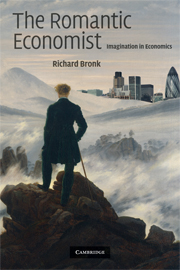Book contents
- Frontmatter
- Dedication
- Epigraph
- Contents
- Preface
- Acknowledgements
- 1 Preface to The Romantic Economist
- PART I THE PRELUDE: THE ROMANTIC ECONOMIST AND THE HISTORY OF IDEAS
- 2 The great divide
- 3 Debates within political economy
- 4 Lessons from Romanticism
- PART II Fragments of Unity: Romantic Economics in Practice
- Notes
- Bibliography
- Index
4 - Lessons from Romanticism
Published online by Cambridge University Press: 05 March 2015
- Frontmatter
- Dedication
- Epigraph
- Contents
- Preface
- Acknowledgements
- 1 Preface to The Romantic Economist
- PART I THE PRELUDE: THE ROMANTIC ECONOMIST AND THE HISTORY OF IDEAS
- 2 The great divide
- 3 Debates within political economy
- 4 Lessons from Romanticism
- PART II Fragments of Unity: Romantic Economics in Practice
- Notes
- Bibliography
- Index
Summary
This chapter serves two purposes: it provides an introduction to major aspects of Romantic thought for those previously unfamiliar with them; and it suggests, somewhat controversially, that there is a loose theoretical coherence to an important subset of these aspects, and to the lessons that can be drawn from them. Scholars in the field would never be likely to agree on a definitive encapsulation of the themes and lessons of Romanticism. Accordingly, the attempt here is the more limited one of isolating a set of important themes that have a good claim to be called ‘Romantic’, and which together suggest a body of interdependent lessons that have the power to transform the way we understand our socio-economic predicament. No apology is offered for mining for linked seams of coherence among the rough-hewn ore of Romanticism.
There are a number of difficulties inherent in any attempt to delineate a definitive set of core Romantic themes and lessons. First, the very concept of Romanticism is an anachronism when applied to the writings of William Wordsworth, Edmund Burke and many of their contemporaries. In Marilyn Butler's words, ‘Romanticism, in the full rich sense we now know it, is a posthumous movement’. Most of the poets and philosophers today classed as Romantic did not see themselves as such at the time; indeed, they would not have recognised themselves as belonging to a single movement at all.
- Type
- Chapter
- Information
- The Romantic EconomistImagination in Economics, pp. 84 - 116Publisher: Cambridge University PressPrint publication year: 2009

